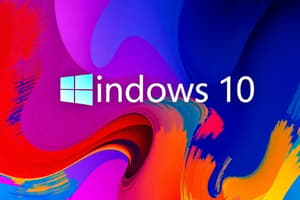Podcast
Questions and Answers
What is the primary function of a domain controller in a network?
What is the primary function of a domain controller in a network?
- Providing storage for user account information
- Handling authentication requests and security policies (correct)
- Managing individual devices within a workgroup
- Transferring data securely between different local networks
How does a domain account differ from a workgroup account?
How does a domain account differ from a workgroup account?
- Domain accounts allow access to resources from any device, while workgroup accounts restrict access to individual devices
- Domain accounts are for large networks with centralized control, while workgroup accounts are for small networks with individual device management (correct)
- Domain accounts require individual user accounts on each device, while workgroup accounts have centralized user account storage
- Domain accounts are only for local networks, while workgroup accounts are for large-scale networks
What advantage does a domain account offer over a workgroup account in terms of user sign-in?
What advantage does a domain account offer over a workgroup account in terms of user sign-in?
- User account information is more secure in domain accounts
- Users can sign in from any computer within the domain (correct)
- User sign-in is faster in domain accounts
- Users have more control over their account information in domain accounts
What is a key characteristic of workgroup accounts?
What is a key characteristic of workgroup accounts?
Which edition of Windows supports up to 6 TB of RAM?
Which edition of Windows supports up to 6 TB of RAM?
Which edition of Windows does not support Remote Desktop Protocol (RDP)?
Which edition of Windows does not support Remote Desktop Protocol (RDP)?
Which feature of Windows provides whole disk encryption and uses Trusted Platform Module (TPM)?
Which feature of Windows provides whole disk encryption and uses Trusted Platform Module (TPM)?
Which edition of Windows allows extensive customization of desktop settings to be applied across all user's Windows devices through a Microsoft account?
Which edition of Windows allows extensive customization of desktop settings to be applied across all user's Windows devices through a Microsoft account?
Which tool enables centralized configuration and enforcement of settings within an Active Directory network in Windows?
Which tool enables centralized configuration and enforcement of settings within an Active Directory network in Windows?
What is the maximum RAM support for Windows Pro edition?
What is the maximum RAM support for Windows Pro edition?
In Windows, what is the primary purpose of workgroups?
In Windows, what is the primary purpose of workgroups?
Which Windows editions have access to Group Policy Editor?
Which Windows editions have access to Group Policy Editor?
What is the purpose of Remote Desktop Protocol (RDP) in Windows?
What is the purpose of Remote Desktop Protocol (RDP) in Windows?
Which Windows edition does not support BitLocker?
Which Windows edition does not support BitLocker?
What is the purpose of domain accounts in Windows?
What is the purpose of domain accounts in Windows?
What is the function of RAM in a computer's operation?
What is the function of RAM in a computer's operation?
Flashcards are hidden until you start studying
Study Notes
Windows Operating System Editions Features Overview
- Workgroups are used to share local resources in a peer-to-peer group of usually no more than twenty computers.
- Windows allows extensive customization of the desktop settings, including themes, colors, and backgrounds, which can be applied across all user's Windows devices through a Microsoft account.
- Remote Desktop Protocol (RDP) allows remote access to a Windows machine, enabling users to view and manipulate the screen through an encrypted exchange, available on all editions except Home edition.
- Different editions of Windows have varying RAM support limitations, with Home edition supporting up to 128 GB, Pro edition up to 2 TB, and Pro for Workstations and Enterprise editions supporting up to 6 TB of RAM.
- BitLocker, available on all editions except Home edition, provides whole disk encryption and uses Trusted Platform Module (TPM) for the encryption process, offering the option to encrypt either the data on the disk or the entire drive.
- Group Policy Editor, available on Windows Pro and Enterprise editions, enables centralized configuration and enforcement of settings within an Active Directory network, with over three thousand Windows settings to choose from, divided into computer configuration and user configuration categories.
- Domain accounts provide users access to domain resources and allow central control of all computers in the domain by a domain controller, while workgroups are for smaller groups of computers on the same local network, where each user has control over their own computer.
- Customization options for the user interface and desktop experience are available across all editions of Windows, allowing users to personalize the taskbar, Start menu, and other desktop elements.
- RAM acts as the working space for the operating system, apps, and data currently being used, with larger RAM capacity contributing to the efficiency of a computer.
- BitLocker's whole disk encryption feature is designed to protect drives in the event of loss or theft, primarily utilizing Trusted Platform Module (TPM) as part of the encryption process.
- Group Policy Editor, available on Windows Pro and Enterprise editions, simplifies changing Registry settings through a graphical snap-in for Windows Settings, offering more than three thousand Windows settings and enabling settings enforcement within an Active Directory network.
- The lesson provides an overview of several features offered with Windows operating system editions, including domain access, workgroups, user interface customization, Remote Desktop Protocol (RDP), RAM support limitations, BitLocker, and Group Policy Editor.
Studying That Suits You
Use AI to generate personalized quizzes and flashcards to suit your learning preferences.




